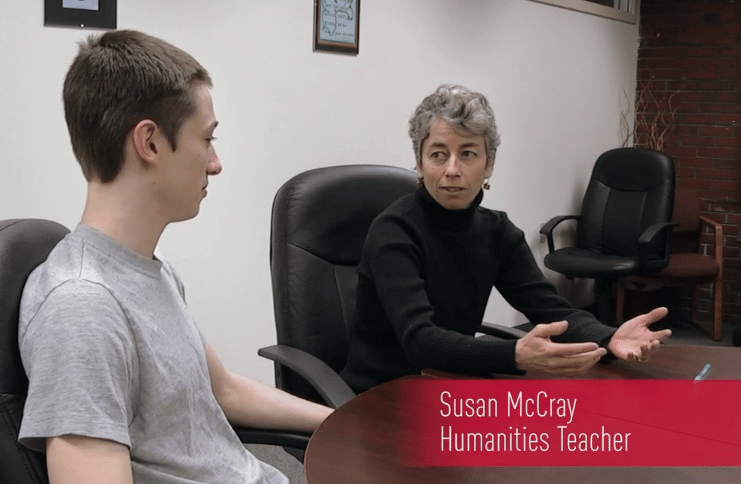Getting Up to Speed on Grading
CompetencyWorks Blog

We are getting ready to release a paper on competency-based grading in January. In the meantime, I know that lots of districts and schools are trying to figure out how to revise their grading system. There is a lot written on the topic but nothing like a video to help spark discussion and give you ideas about how to communicate the need for redesigning grading. So here are some of my favorites. You can also find examples of grading systems from four different school models at the Competencyworks wiki.
The Problem with the A-F Grading Scheme: Doug Reeves talks about zeros and the relationship to disciplinary issues, trending rather than averaging, late work and getting the work done, and teaching children resilience in Toxic Grading Practices. My favorite quote: How many have heard these words from a student: Just give me the zero. The operative word being “give.” Because they’re used to simply getting by and maybe a little smiley face will get them a D or something. No. You want to do something really scary? Get the work done. And I’m quoting this one young man now because his words were so persuasive to me: “It is such a hassle in this school man. You try to turn in this stuff in and she gives it back to you. You miss it, she makes you do it again. You can’t even get a D. It’s such a hassle in this school, man, to get a C. You might as well get a B.” Whereupon we have the wonderful spectacle of whining adolescents belly-aching all the way to the honor roll. (Go to 5:27 – 6:06.)
Standards-Based Grading: There are books and books and lots of articles written about standards-based grading, but there are limited video resources.
- I think this Overview of Standards-based Grading does a good job at giving the basics.
- In Why Use a Standards-Based Grading System? from Expeditionary Learning, a parent, a student, a teacher, and the principal from Casco Bay High School in Portland, ME, discuss how standards-based grading works and the benefits of the system.
- Standards-based Grading and the Game of School is a TEDTalk by Craig Messerman, a 9th and 10th grade physical science and biology teacher at Sentinel High School in Missoula, MT.
Defining Mastery: In order to do standards-based grading, there has to be a shared understanding of what proficiency is or what students are expected to master.
- Rick Wormelli discusses Defining Mastery
- Karin Hess provides an overview of Webb’s Depth of Knowledge (from NYC Department of Education). There is also a full version. Tree TopSecret’s presentation on Bloom’s Taxonomy and Depth of Knowledge is available on the web.
- In this video Allison Marks, English teacher at Forest Grove in Oregon, talks about proficiency education standards-referenced grading. She describes what she and colleagues had to do to work together to create a school-wide understanding of proficiency of each standard. She also explains the reason that her school turned to proficiency-based education: The reason that we decided to make the move to proficiency is that, around 2007 and 2008, we would have upwards of 25 valedictorians and then when we looked at their SAT scores, they would be scoring below the state and national average on the SAT. So we were realizing that our grades that we were assigning to kids didn’t really mean anything. And we wanted to make sure that we changed that. (Go to 1:43 – 2:05 in her interview.)
Feedback and Re-Assessments: Two of the big ideas in designing grading for competency education is to make sure it is generating useful feedback for students and that those that are not yet proficient have incentives to keep learning.
- Descriptive Feedback Helps All Students Reach Proficiency – Standards-Based Grading – From Expeditionary Learning: 11th grade ELA teacher Susan McCray from Casco Bay High School in Portland, ME, supports all students in reaching writing standards through descriptive feedback.
- Rick Wormelli on Redos, Retakes, Do-Overs.
Homework, Late Work and Zeros: Standards-based grading forces us to change a number of practices and raises a lot of questions for teachers, students, and parents. Rick Wormelli has several videos that help explain why these are problems, including Standards-based Grading, in which he tackles the problem of zeros, Late Work, and How Much Homework Should Count.
Gradebooks, Report Cards, Transcripts, and Information Systems: Schools and districts are creating new mechanisms to communicate student progress.
- Grade Books: In Understanding Grades in a Standards-Based System also from Expeditionary Learning, 11th grade ELA teacher Susan McCray from Casco Bay High School in Portland, ME, explains how she sets up her gradebook for standards-based grading. Rick Wormelli also has a piece on Gradebooks.
- Transcripts: Great Schools Partnership webinar on their work in designing proficiency-based transcripts. You can listen to the webinar and see the prototype transcripts here.
- Information Systems: It’s hard to find videos that explain the current state of the art of the learning management systems such as Educate and Buzz. Tom Vander Ark takes a look at Buzz on Getting Smart and I wrote a piece here. I’ll try to find someone to write about Educate so that others can get a sense of the functionality of these information systems.
If you’ve got a favorite video, please pass it on so we can have the best set of resources for folks.